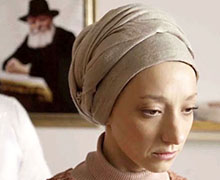What happens when faith, religion and sexuality collide in an ultra-Orthodox community? BARREN, a film nominated for Best Israeli Film at the Jerusalem Film Festival, tackles that question. Director/screenwriter Mordechai Vardi, who is a rabbi, Tel Aviv University film school graduate, and former head of the screenwriting department at one of Israel’s most prestigious film schools, provides a multi-layered perspective.
Praised by critics for its acting and photography, Barren is a unique look inside this insular community. Infertility is a taboo subject in many societies, but it is especially distressing among the ultra-Orthodox with its encouragement of large families and wariness of medical intervention. The biblical meaning of “barren” is “to uproot”, the opposite of “to plant” and conveys the idea of “emptiness”.
The story revolves around a young couple, Feigi and Naftali, who live with Naftali’s parents. They have been married for five years and are unable to conceive. Putting his faith solely in prayer, Naftali flies to Uman in the Ukraine to pray for a child at the grave of Lubavitcher rabbi Nachman at Rosh Hashanah. At the same time, Naftali’s father invites an itinerant rabbi to his home for dinner. He claims to be a healer and tells Feigi that he can perform a ritual to make her fertile. He says that the ritual must occur before Rosh Hashanah. That night he goes into Feigi’s bedroom and convinces her to let him have sex with her.
The consequences of the encounter are at the heart of the film which is based on actual cases. The husband’s reaction, Feigi’s inner struggle, and a ruling by a rabbinical panel sharpen the issues that women in the ultra-Orthodox community face in dealing with infertility and faith. But it’s also a story of faith within contemporary society and the challenges in balancing the two.


